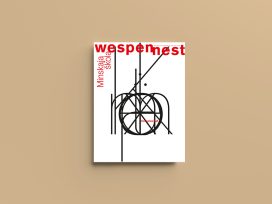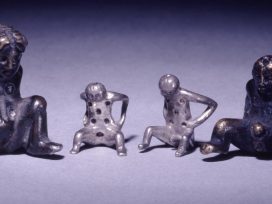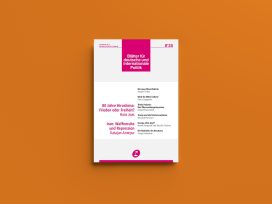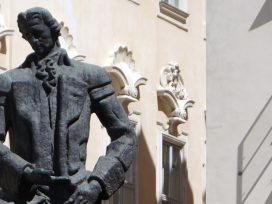
Slovenian philosopher and social critic Slavoj Zizek has long been known as the enfant terrible of the intellectual world, but some might wonder if even he hasn’t now gone too far. It was not enough that, as conventional wisdom was announcing with finality the death of Communism and dismissing with contempt anything related to the old Soviet Union, Zizek would publish a book proclaiming the need for “Repeating Lenin”. But now, in a book with a guillotine appropriately emblazoned on the cover, he has decided to champion boldly the legacy of the Reign of Terror’s own Maximilien Robespierre. The central theme of Zizek’s recent work on Lenin, Robespierre and the topic of totalitarianism is the necessity of “the Act”. Some observers might be tempted to ask whether his entire intellectual oeuvre is also some kind of act.
In recent years Zizek seems always to be on the public stage. In 2005, he married 26-year-old Argentine model Analia Hounie in a celebrity wedding heavily covered by the international news media. It has been reported that Hounie is the daughter of Lacanian psychoanalysts, that she has read and understands quite competently Zizek’s difficult and voluminous works, and (depending on the report) that she either is or is not a genius. News photos proliferated of the beautiful, smiling young bride and the not so young philosopher, who appeared at times either bemused or slightly crazed. The same year saw the release of the full-length documentary Zizek!, in which viewers got to see the intellectual superstar electrifying huge crowds, showing off his minimalist apartment and philosophising non-stop. The following year, fans were treated to two Zizek films, including The Pervert’s Guide to Cinema, broadcast by Channel 4. In this tour de force, Zizek guided his audience through the labyrinth of Hegelian and Marxist dialectics and Lacanian psychoanalysis in a rapid-fire commentary on 43 films, from The Marx Brothers to Hitchcock to David Lynch. In all these documentaries, we see a hyperactive, frenetic, twitching, gesticulating Zizek, obviously (as recommended by the title of one of his books) enjoying his symptoms. Finally, in 2007, the International Journal of Zizek Studies was established, and Zizekology became an official field of study.
While Zizek’s popular reputation has grown, and his brilliant, witty and outrageously provocative lectures and books have attracted huge audiences, he has encountered considerable hostility in the world of academic “theory”. One critic even proposed starting an “Anti-Zizek League”, which may be the ultimate testament to the efficacy of his philosophical gadflyhood. A prime example of academic Zizekophobia is The Truth of Zizek, a recent book that should perhaps be charged with false advertising. It is not really concerned with the truth of Zizek, but rather the truth about Zizek, as in “we’ve dug up all the dirt on Zizek”. The contributors are obviously driven to distraction by Zizek’s view that the faddish postmodernism that has proliferated in academia is implicitly the most advanced form of capitalist ideology, and that we need to make the “fateful step from ludic ‘post-modern’ radicalism to the domain in which the games are over”.
For the moment, however, the game goes on. This “rigorous critical assessment”, as the cover blurb of The Truth of Zizek proclaims, is in fact a mélange of shoddy scholarship, spleen-venting and ludicrous stabs at being radical. For example, Jeremy Gilbert, indignant at Zizek’s criticisms of Cultural Studies, tries to convince the reader that Zizek writes like a right-wing demagogue, says the same things as a right-wing demagogue, and attacks the same things as a right-wing demagogue. His conclusion is, of course, that Zizek is not a duck. Ian Parker, on the other hand, claims that Zizek’s “trajectory” is “toward fake-leftist individualism”. Right, left, whatever.
The collection culminates with Jeremy Valentine’s tirade against Zizek’s supposed “Left-wing Fogeyism”. Valentine thinks that if he divulges “what really gets on Zizek’s tits” and reveals that “instead of buggering Deleuze, Zizek is simultaneously fucked by Deleuze and Lacan”, Zizek’s demolition of Valentine’s kind of infantile pomo antics will be exorcised. It won’t. The one merit of this Bloody Valentine to Zizek is that the author sums up well the outlook of many of Zizek’s postmodernist critics: “life is too short to worry about being right” so “just grab what you can.”
There is at least one serious criticism in the book. Philosopher Simon Critchley contends that Zizek is “whistling in the dark” and that his proposals for action amount to nothing more than “vague apocalyptic allusions to violence”. Even more to the point is Oliver Marchart’s claim that Zizek advocates “a purely abyssal and decisional act” that Lenin (the very figure whom Zizek urges us to “repeat”) would have dismissed as mere “adventurism”. In other words, the charge is, once again, that Zizek’s Act is just an act. This brings us to our primary question. All games aside, what is, in fact, the nature of Zizek’s “Act”?
Zizek’s analysis might well give some careless readers the impression that it is groundless, purely spontaneous, and might lead nowhere in particular. For example, he says that the revolution he envisions “ne s’authorise que d’elle même” – it is its own justification. He also explains that revolutionary action is “exactly like making a leap of faith”. But if that’s what it is “exactly” like, perhaps one might reasonably conclude that it’s no more than a baseless, irrational exercise of will.
However, Zizek’s critics might have thought twice before latching on to a few isolated passages that might imply such a purely spontaneous, ungrounded Act with no real end in view. After all, Zizek is a harsh Hegelian critic of any abstract ideas of the Right and the Good that are detached from history and reality. Moreover, anyone who has read even a little Zizek knows that when he says that something is “exactly” or “precisely” some way, we find out later that it’s also “exactly” and “precisely” some other way.
Zizek no doubt intends to shock the reader when he praises Robespierre’s defence of terror and calls for “repeating Lenin”. However, that’s not the main point. It’s not just a pose; it’s a position. He explains that he wants to “repeat Lenin” in a Kierkegaardian sense: “to retrieve the same impulse in today’s constellation”. This is the impulse to focus resolutely on the conditions that authorise the Act. Moreover, the legacy of Robespierre that he affirms is also quite specific: his commitment to the necessity of “large-scale collective decisions”. So the Act isn’t about the guillotines or the Checka, but about the ability to envision the possibility of qualitative changes in society and to act on this vision.
Zizek holds that “there are no innocent bystanders in the crucial moments of revolutionary decision”. By “crucial moments” he doesn’t mean only a 1789 or a 1917. There are no “innocent bystanders” now, as various genocides and ecocides are being carried out in our name, and the products of our labour are being used to destroy, exploit, oppress and murder. Despite being on the opposite end of the philosophical spectrum, Zizek has something here in common with a thinker like utilitarian ethicist Peter Singer. How, asks Singer, can I justify squandering wealth on luxuries while others are starving, and I could save many lives with at most a small sacrifice? He concludes that the reallocation of this wealth (and indeed much more) is not “charity” but rather strict justice. Zizek makes a similar point. I am not innocent when I allow preventable atrocities to go on and merely pretend that I’m incapable of acting. This is the ethical grounding of the Act.
Zizek discusses several possible paths for action. At times he stresses the course of indirect action rather heavily. He laments the fact that the options that now seem realistic are those that allow everything to remain fundamentally the same. This is exemplified by the obsession with recycling and Green consumerism, in which gestures that cannot possibly have a significant effect on the underlying problems (global climate change, mass extinction, ecocide) replace the will to act decisively. Other examples include the concern with politically correct language or endless apologies offered to victimised groups. These gestures act as substitutes for concerted action against structural racism or actual genocide. Zizek rejects such illusory forms of action in favour of opposition to global capital through challenging “the hegemonic ideological coordinates”. Does this mean that Zizek is willing to settle for “the terrorism of pure theory”? Not at all.
Elsewhere, Zizek is quite specific about what the Act might mean in terms of large-scale political action. He cites what Badiou sees as the four moments of revolutionary justice: first, voluntarism, or the faith in one’s ability to act; second, willingness to use “terror” to “crush the enemy of the people”; third, the will to take “egalitarian justice” as far and as quickly as necessary; and, finally, trust in the people. He explains how a response to the ecological crisis might embody these elements. It would imply a willingness to impose uniform standards everywhere in order to solve the problem; a readiness to inflict “ruthless punishment” on those who resist; a commitment to immediate, large-scale, drastic changes; and faith that “the large majority” will ultimately endorse this course of action.
Zizek doesn’t say what “ruthless punishment” might mean, but presumably it would include heavy fines and imprisonment. It might also require strong pressure or even coercive means against regimes that resist. Some might say this is harsh. Zizek’s response is that we should consider the alternative to acting. Decades may pass while debate continues over reaching standards like those of the Kyoto Protocols, which are entirely inadequate to solve the problem. Rising sea levels may inundate lands where hundreds of millions of people now live, and unprecedented social chaos may result. Ruin of agricultural lands may inflict famine on hundreds of millions, if not billions. Which produces the greatest terror, action or inaction?
For Zizek, our situation today is much like that of the partygoers in Buñuel’s film The Exterminating Angel, who are unable to leave the building, even though the door is unlocked. The prevailing condition of paralysis is called “democracy” in most of the world. According to Zizek, under mass democracy “the social body is symbolically dissolved, reduced to a pure numerical multitude. The electoral body is precisely not a body, a structured whole, but a formless abstract multitude.” There is no room for agency. The criterion for judging political regimes is similar to the criterion for judging the corporate-dominated consumer economy. Are my most basic biological needs being reasonably fulfilled, and is my fantasy of the good life through consumption of commodities being reasonably sustained? According to Zizek, under late capitalism “the true content of global liberal democracy” is “the biopolitical administration of life”. The result is a kind of degraded version of Plato’s ancient dream of philosopher-kingship, in which the rulers ensure that the basic needs of the masses (who are treated as producing and consuming machines) are taken care of, they are given a “Noble Lie” (fundamental fantasy) to channel their desire and quiet their doubts, and there remains no reason for them to “act” in any political sense.
Zizek looks to a future beyond the fantasy. He invokes the concept of the passage á l’acte, which in Lacanian psychoanalysis signifies an exit from the fantasy scene. It also means leaving the symbolic, the realm of the Big Other, the realm of domination. It means a confrontation with the real. This could be the real of our own lives or the real of our collective history. Critics who see mere adventurism in Zizek ignore this dimension – his call for the substitution of the “passion for the real” for the passion mobilised and channelled by fantasy and fetishism. The authentic Act cannot be for Zizek a mere revolutionary moment, a new fantasy scene. He endorses what Badiou calls “fidelity to the event”, the resolution to create “a new lasting order”. The ethical imperative embodied in Zizek’s concept of the Act requires that that the subjective spirit of revolt find its fulfilment in an objective order of history.
This takes us back to the nature of the site événementiel, the stage of the Act. Zizek says that “in a genuine revolutionary breakthrough, the utopian future is neither simply fully realised, present, nor simply evoked as a distant promise which justifies present violence – it is rather as if, in a unique suspension of temporality, in the short circuit between the present and future, we are – as if by Grace – briefly allowed to act as if the utopian future is (not yet fully here but) already at hand, there to be seized.” Zizek alludes here to the numinous, ecstatic dimension of revolutionary transformation. But it can also be realised before the Big Act, le Grand Soir, arrives. In fact it is the secret of any truly liberatory form of life.
Zizek recognises this when he says that “the time has come to start creating what one is tempted to call liberated territories, the well-defined and delineated social spaces in which the reign of the system is suspended: a religious or artistic community, a political organisation.” Marchart judges such ideas of “self-organised collectives in zones outside the law” to be nothing more than “separatism and escapism”. However, he has it precisely backwards. These proposals represent the exact point at which Zizek proposes the most authentic encounter with the real (as opposed to the post-modern flight from the real) and some hope for a repetition of Lenin that does not repeat the Leninist tragedy. He proposes an act that is beyond revolutionary fantasy, beyond heroic virtue.
In such ideas, one finds a bridge between his inescapable moral imperative to break with a destructive fantasy-world through a decisive Act, and his recognition that the conditions for action, for the shaping of the site événementiel must be created through a long history of much less dramatic but no less decisive Acts. In a sense, this is a shift from revolutionary gesture to revolutionary gestation. It is possible that a social order does not finally perish until not only the material conditions for new relations but, to a certain degree, those new relations themselves have grown up within the womb of the old society.
So how, in the end, do we judge Zizek’s Act? If it is a question of a response to his philosophical act, it seems to me that we can only applaud his magnificent performance. But if we confront his challenge of the moral necessity of the Act, beyond theatrics, beyond the spectacle, we are each faced with the imperative to make our own judgment. And to act.
The Truth of Zizek was published by Continuum in 2007. Did Somebody Say Totalitarianism?, Virtue and Terror: Maximilien Robespierre and V.I. Lenin: Revolution at the Gates were published by Verso in 2007.







